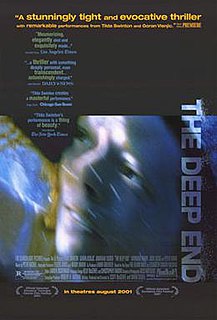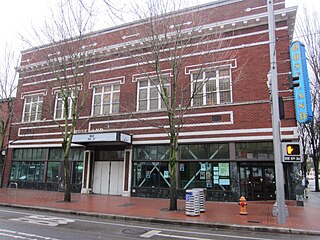Related Research Articles
In United States law, an Alford plea, also called a Kennedy plea in West Virginia, an Alford guilty plea, and the Alford doctrine, is a guilty plea in criminal court, whereby a defendant in a criminal case does not admit to the criminal act and asserts innocence, but admits that the evidence presented by the prosecution would be likely to persuade a judge or jury to find the defendant guilty beyond a reasonable doubt.
In legal terms, a plea is simply an answer to a claim made by someone in a criminal case under common law using the adversarial system. Colloquially, a plea has come to mean the assertion by a defendant at arraignment, or otherwise in response to a criminal charge, whether that person pleaded or pled guilty, not guilty, nolo contendere, no case to answer, or Alford plea.
In law as practiced in countries that follow the English models, a pleading is a formal written statement of a party's claims or defenses to another party's claims in a civil action. The parties' pleadings in a case define the issues to be adjudicated in the action.
Special pleading is an informal fallacy wherein one cites something as an exception to a general or universal principle, without justifying the special exception. It is the application of a double standard.
In English law, the benefit of clergy was originally a provision by which clergymen could claim that they were outside the jurisdiction of the secular courts and be tried instead in an ecclesiastical court under canon law. Various reforms limited the scope of this legal arrangement to prevent its abuse, including branding of a thumb upon a first use, to limit number of invocations for some. Eventually the benefit of clergy evolved into a legal fiction in which first-time offenders could receive lesser sentences for some crimes. The legal mechanism was abolished in the United Kingdom in 1827 with the passage of the Criminal Law Act 1827.
Death by crushing or pressing is a method of execution that has a history during which the techniques used varied greatly from place to place, generally involving placing heavy weights upon a person with the intent to kill. This form of execution is no longer used by any government.
A demurrer is a pleading in a lawsuit that objects to or challenges a pleading filed by an opposing party. The word demur means "to object"; a demurrer is the document that makes the objection. Lawyers informally define a demurrer as a defendant saying "So what?" to the pleading.

The Judicature Acts are a series of Acts of Parliament, beginning in the 1870s, which aimed to fuse the hitherto split system of courts in England and Wales. The first two Acts were the Supreme Court of Judicature Act 1873 and the Supreme Court of Judicature Act 1875, with a further series of amending acts.
Pleading the belly was a process available at English common law, which permitted a woman in the later stages of pregnancy to receive a reprieve of her death sentence until after she bore her child. The plea was available at least as early as 1387 and was eventually rendered obsolete by the Sentence of Death Act 1931, which stated that an expecting mother would automatically have her death sentence commuted to life imprisonment with hard labour.
The Federal Rules of Civil Procedure govern civil procedure in United States district courts. The FRCP are promulgated by the United States Supreme Court pursuant to the Rules Enabling Act, and then the United States Congress has seven months to veto the rules promulgated or they become part of the FRCP. The Court's modifications to the rules are usually based upon recommendations from the Judicial Conference of the United States, the federal judiciary's internal policy-making body.
In a court of law, a party's claim is a counterclaim if one party asserts claims in response to the claims of another. In other words, if a plaintiff initiates a lawsuit and a defendant responds to the lawsuit with claims of their own against the plaintiff, the defendant’s claims are “counterclaims.”
In law, an allegation is a claim of an unproven fact by a party in a pleading, charge, or defense. Until they can be proved, allegations remain merely assertions.

Beauly railway station is a railway station in the village of Beauly, in the Highland council area of Scotland. Located on the Far North Line, it is 10 miles 12 chains (16.3 km) down the line from Inverness, and it is the first intermediate station on the line, before reaching Muir of Ord.

The Deep End is a 2001 American thriller film written and directed by David Siegel and Scott McGehee. It stars Tilda Swinton, Goran Visnjic, Jonathan Tucker and Josh Lucas and was released by Fox Searchlight Pictures. The film was very loosely adapted from the novel The Blank Wall by Elisabeth Sanxay Holding. The film premiered in competition at the Sundance Film Festival where English cinematographer Giles Nuttgens won the Best Cinematography award.

Joseph Robinette "Beau" Biden III was an American politician, lawyer, and officer in the Army Judge Advocate General's Corps from Wilmington, Delaware. The oldest child of current U.S. president Joe Biden and Neilia Hunter Biden, he served as the 44th attorney general of Delaware from 2007 to 2015 and was a major in the Delaware Army National Guard in the Iraq War. He died of brain cancer in 2015 at the age of 46. His father would be elected President five years after his death.
A special pleader was a historical legal occupation. The practitioner, or "special pleader" in English law specialised in drafting "pleadings", in modern terminology statements of case.

The Pleading in English Act 1362, often rendered Statute of Pleading, was an Act of the Parliament of England. The Act complained that because the Norman French language was largely unknown to the common people of England, they had no knowledge of what was being said for or against them in the courts, which used Law French. The Act therefore stipulated that "all Pleas which shall be pleaded in [any] Courts whatsoever, before any of his Justices whatsoever, or in his other Places, or before any of His other Ministers whatsoever, or in the Courts and Places of any other Lords whatsoever within the Realm, shall be pleaded, shewed, defended, answered, debated, and judged in the English language, and that they be entered and inrolled in Latin".
Ashcroft v. Iqbal, 556 U.S. 662 (2009), was a United States Supreme Court case which held that plaintiffs must present a "plausible" cause of action. Alongside Bell Atlantic Corp. v. Twombly, Iqbal raised the threshold which plaintiffs needed to meet. Further, the Court held that government officials are not liable for the actions of their subordinates without evidence that they ordered the allegedly discriminatory activity. At issue was whether current and former federal officials, including FBI Director Robert Mueller and former United States Attorney General John Ashcroft, were entitled to qualified immunity against an allegation that they knew of or condoned racial and religious discrimination against Muslim men detained after the September 11 attacks. The decision also "transformed civil litigation in the federal courts" by making it much easier for courts to dismiss individuals' suits.
Legal practice is sometimes used to distinguish the body of judicial or administrative precedents, rules, policies, customs, and doctrines from legislative enactments such as statutes and constitutions which might be called "laws" in the strict sense of being commands to the general public, rather than only to a set of parties.

The Roseland Theater, sometimes called the Roseland Theater and Grill, is a music venue located at 8 Northwest Sixth Avenue in the Old Town Chinatown neighborhood of Portland, Oregon, in the United States. The building was originally a church, constructed by the Apostolic Faith Church in 1922. In 1982, Larry Hurwitz converted the building to a music venue called Starry Night. In 1990, the club's 21-year-old publicity agent was murdered in one of the theater's hallways; Hurwitz was convicted for this murder ten years later. Hurwitz sold the club in 1991, claiming he had lost support from the local music industry. The venue was given its current name during the 1991 ownership transfer. During the 1990s, Double Tee acquired control of the hall's operations, then purchased and renovated the building.
References
![]() This article incorporates text from a publication now in the public domain : Chambers, Ephraim, ed. (1728). "Beau pleader". Cyclopædia, or an Universal Dictionary of Arts and Sciences (1st ed.). James and John Knapton, et al.
This article incorporates text from a publication now in the public domain : Chambers, Ephraim, ed. (1728). "Beau pleader". Cyclopædia, or an Universal Dictionary of Arts and Sciences (1st ed.). James and John Knapton, et al.